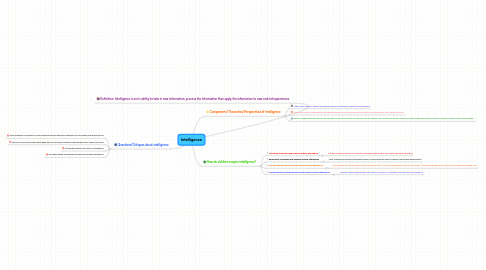Intelligence
by Sonya Jones


1. Components/ Theoretical Perspectives of Intelligence
1.1. Cattell: Their ability to acquire knowledge quickly and thereby to adapt to new situations
1.2. Sternberg's model of intelligence: intelligence behavior involves enviornmental context, prior experience, and cognitive process
1.3. Gardner suggest that edcuators must embrace the human potential and porpose that all student can successfully master classroom subject mater when the instruction capitalize on their intellectual strenghts
2. How do children acquire intelligence?
2.1. Hereditary influences how children acquire intelligence
2.1.1. The twins study revealed a IQ correlation between identical twin even when they were separated
2.2. Eviornment influneces how children acquire intelligence
2.2.1. Toxic substances during pre/postnatal stages of developmental effects children neurological development
2.3. Play experiences influence how children acquire intelligence
2.3.1. Play experiences provide children with the opportunties to construct knowledge, interact with others, increase language, and increase their cognitive processing skills
2.4. Discriminatory practices influence how children acquire intelligence
2.4.1. Minority children opportunites are limited as a result of systematic and long-term discrimination
